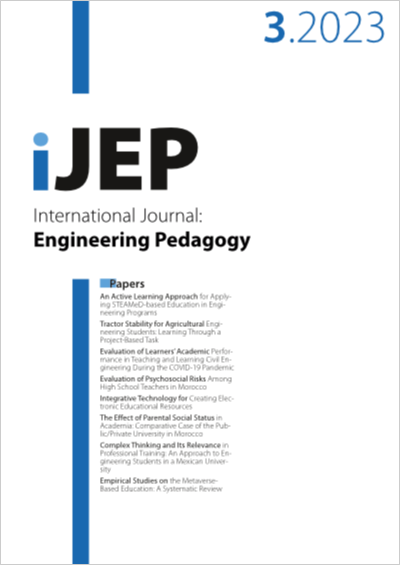Evaluation of Psychosocial Risks Among High School Teachers in Morocco
DOI:
https://doi.org/10.3991/ijep.v13i3.36521Keywords:
psychosocial, risks, high, school, teachers, MoroccoAbstract
Professional hazards, particularly psychosocial risks that are likely to affect teachers' physical and mental health, are a particular concern in the education sector. It is in this context that this research work lies to evaluate the psychosocial risks encountered by secondary school mathematics teachers in Safi city (Morocco). Indeed, it is a cross-sectional descriptive study based on a questionnaire that compiled socio-demographic and professional data as well as the psychometric variables of the French version of the KARASEK questionnaire. The latter has three components, namely psychological demand (PD), decision latitude (DL), and social support (SS).
The sample consisted of 218 teachers, ranging from 22 to 61 years old, and the participation rate was 72.66%. The sex ratio was 1.5, out of which 61% were males surpassing that of women, 39%. The prevalence of stress risk variables was 98%, 79%, and 4% for high PD, low DL, and low SS, respectively. While Isostrain prevalence was detected only in 2% of instances, job strain was present in 77% of them.
It is trusty to mention that men are proven to be more exposed to the lack of social support, “Job-strain” and isostrain than women. Indeed, they experience stress at work, thus demonstrating that psychosocial risks are significant occupational exposure for teachers. These results promote the development of prevention means to improve working conditions and protect the teachers’ well-being.
Downloads
Published
How to Cite
Issue
Section
License
Copyright (c) 2023 IKRAM DOUELFIQAR

This work is licensed under a Creative Commons Attribution 4.0 International License.



